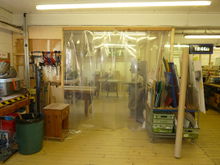Workshop Dusty Area fit: Difference between revisions
mNo edit summary |
m Danspencer101 moved page Project:Workshop Dusty Area to Workshop Dusty Area over redirect |
(No difference)
| |
Revision as of 16:02, 31 January 2019
| Workshop Dusty Area fit | |
|---|---|
 | |
| Created | 22/08/2013 |
| Completed | 18/11/2018 |
| Members | Woodworking Team |
| Status | Complete |
| Type | Hackspace Infrastructure |
Workshop Dusty Area
The initial dusty area project has long been finished, making use of a small dust extractor and vacuum cleaners for cleaning and dust control.
Phase 2 now beckons:
- Removal of dumped scrap wood - this area is not a woodstore!
- Installation and commissioning of larger dust extractor.
- Installation of ducting between larger dust extractor and the tools that require connections.
- Installation of additional lighting (the area between the windows, used for the chop-saw bench is not well-enough lit).
- (Possibly) removal of the heavy workbench to the main workshop area to allow greater room around the wood lathe / table saw.
- (Ongoing) Pledge drive to get a better Table Saw
Original Project
No, we don't want to create a dusty area as such, this is all about containing dust from those wookdworking tools that create it, and preventing it from affecting other users and tools in the workshop.
The idea is to partition off the rear left-hand corner of the workshop (approximately 13' wide by 19' deep) with a long wall of hardboard on studding at low level with transparent plastic above (to not reduce the general light level in the workshop) and with a dangly-clear-plastic curtain as the short wall.
Within the area we will build a large duct and fan system to move the dust created by tools such as the bandsaw, table saw, belt&disc sander the bags for disposal.
Key Dates:
Creation of project page 22nd August 2013
Studding and hardboard delivered 24th August 2013
Work starts Monday 26th August - Fan and electrical socket now moved to allow construction of long wall.
Project Contacts
- David Clarke (Page creation, general guidance as to project direction)
- Dominic
- User:some_third_person
Sequence of construction
- Obtain Materials (DONE)
- Remove items obstructing access to girders above (Fan, sockets, etc.) (DONE)
- Measure accurately
- Fix long top rail in place
- Cut available clear acrylic to size
- Fit Vertical studs, spaced to suit hardboard panel size / acrylic size
- Fix short top-rail for hanging dangly-curtain
- Fit hardboard, pegboard, acrylic panels
- Cut filler-pieces for above the girder level
- After this, the electrical feed needs installing, followed by:
- Fan extraction / dust control installation and commissioning
- Dangly curtain install
Other Stuff
Initial plans.
Costings
Items Required 3"x2"x8' CLS studding (Gross quantities, assuming 20' x 16', excess material can be for noggins) Soleplate 20' + 4' = 3 lengths Head Rail 20' + 16' = 5 lengths Mid Rail 20' + 4' = 3 lengths Verticals @ 4' throughout 6 + 1 + 2 = 9 lengths 20 lengths 2"x3"x8' CLS studding
The studding has now arrived at the Hackspace.
4 sheets 3mm hardboard for wall panelling
We have 3 sheets of hardboard at the Hackspace. (and there is some 'stock' together with pegboard).
2 sheets clear plastic sheet (acrylic or polycarbonate) glazing. Hardware, electrical gear for fan (we have the motor and fan already)
Some photos perhaps? Awaiting these.
Dusty Area Expansion
In late 2018 the dusty area was expanded by the Woodworking team to extend into the area that used to be sheet storage.
Page based on template suggested by Michael Erskine
